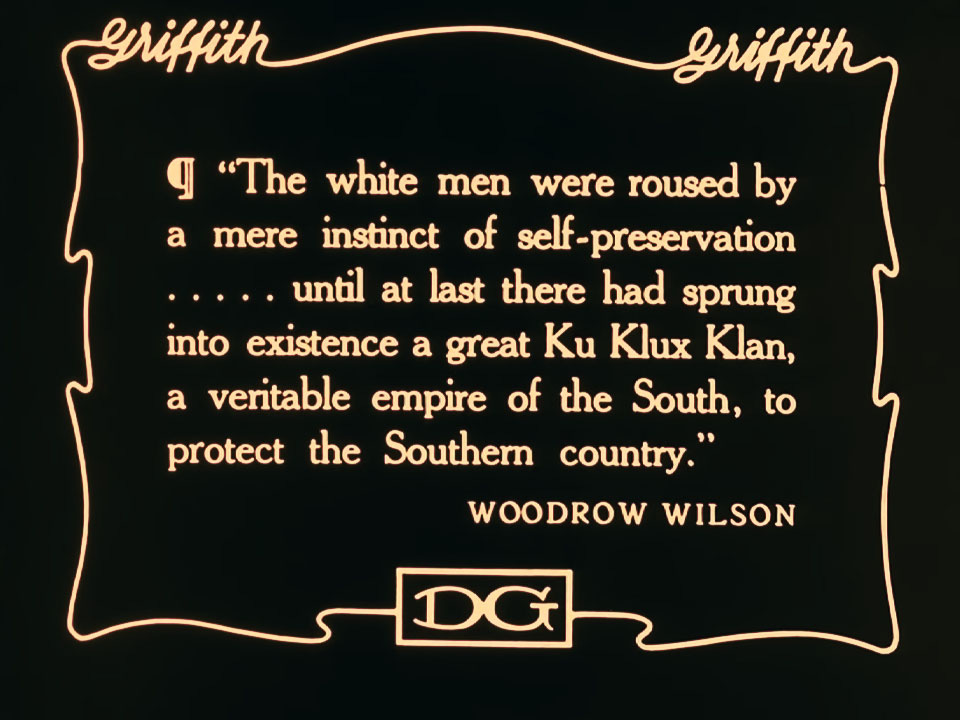
In 1915, D.W. Griffith's The Birth of a Nation was a cinematic milestone, revolutionizing the art of filmmaking with its innovative techniques. Yet, beneath its technical prowess lay a deeply troubling narrative that glorified the Ku Klux Klan and propagated the myth of the "Lost Cause."
It was a sensation among white audiences nationwide upon its release. And the film's success was both a consequence of and a contributor to racial segregation throughout the U.S.

The film's launch was accompanied by an array of marketing materials, including a Souvenir Booklet and Pressbook. In New York City, promoters sent white-robed horsemen riding through the city to advertise the new film about heroic Klansmen.
From Pressbook: "The Birth of a Nation" presents many lovable negroes who win hearty applause from the audiences. It presents also some exceedingly hateful negroes. ... it is to the advantage of the negro of today to know how some of his ancestors misbehaved and why the prejudices in his path have grown there.

These promotions played a pivotal role in shaping the film's reception. They emphasized the valor of the Confederacy - turning the Klan into heroes, rewriting the brutal realities of the Civil War and Reconstruction into a palatable story for Confederate sympathizers.
Adapted from Thomas Dixon Jr.'s 1905 novel and play The Clansman, the film portrayed its black characters (many of whom are played by white actors in blackface) as unintelligent and sexually aggressive toward white women.
The Ku Klux Klan is celebrated as the heroic force, necessary to preserve American values, protect white women, and maintain white supremacy.

President Woodrow Wilson, a racist southerner, screened the film at the White House (a first) and repeated the next day to the entire Supreme Court, 38 Senators, and the Secretary of the Navy. Fun fact: Wilson was Dixon’s classmate at Johns Hopkins University.
The Birth of a Nation was a massive commercial success—grossing far more than any previous motion picture—and it profoundly influenced both the film industry and American culture.
It also became a vehicle for romanticizing the Confederacy's "Lost Cause" - an ideology that painted the Confederate defeat in a positive light, downplaying slavery as the war's cause and celebrating the antebellum South. It provided justification for the racial violence and terrorism employed to reverse Reconstruction and reimpose white supremacy during the Jim Crow era.

African American writer James Weldon Johnson wrote in 1915 that The Birth of a Nation did “incalculable harm” to Black Americans by creating a justification for prejudice, racism, and discrimination for decades to follow.
That same year, the Ku Klux Klan, inactive since the trials of 1872, reemerged across the country to terrorize African Americans and immigrants.
More on the Klan
The Klan on a Ferris Wheel (1926)
Sitting three abreast and taking up all 12 of the wheel's buckets, the hooded men face the camera. Like the five Klansmen standing below them, they all seem to emanate malevolence, creating a surreal juxtaposition of progressive and regressive symbols




Well done! People need to understand how deeply embedded racism is into the fabric of American life. Here's the first motion picture ever, the first "big box office smash", and it denigrates Black people and propagates racism while rewriting history.
Our club votes from a curated list each month to determine what we'll watch and discuss. I am thinking of proposing a category "Worst Films Ever" and suggesting this one for the list. Kinda doubt the club founder will go for it...
I managed to avoid ever seeing the film when I was young, and now I have plenty reasons not to see it, but its power over US culture should not be underestimated.
What a screwed up place we live in...